Honorary Professor Dr. Axel Adrian

Person and Career
- 1969 born in Fürth
- 1975 School enrolment in San Diego Cal./USA
- 1989 Abitur at Hardenberg-Gymnasium in Fürth
- 1989 – 1994 law studies at the FAU
- 1994 – 1996 legal clerkship in Nürnberg and Ansbach
- 1996 – 1997 lawyer in the central legal department of Siemens AG
- 1997 – 2000 notary Assessor in Feuchtwangen and Fürth
- 2000 – 2006 notary in Naila
- Since 01.04.2006 notary in Nürnberg
- Since 2019 honorary professor at the University of Erlangen-Nuremberg
Homepage of the notary’s office
Authorisation to teach
- Legal theory and legal design
Academic Focus
- Philosophy of science, theory of law, legal methodology, philosophy of law
- Legal-Tech, in particular interdisciplinary questions of law and structural or computer science (logic, mathematics, computer science)
- Constitutional law, electoral law, demography
- civil law
Overview of the links to my YouTube videos
Legal Tech – buzzword or hype?
https://www.youtube.com/watch?v=OZJsF_CNupw
Overview: Legal tech, logic, subsumption, and AI disciplines.
https://www.fau.tv/clip/id/41658
Interviews
Legal Tech – Does the traditional legal system have to adapt? – Interview with Prof. Dr. Franz Hofmann
https://www.youtube.com/watch?v=hVBn6gJxUyw
What is behind legal design? – Interview with attorney Baltasar Cevc
https://www.youtube.com/watch?v=M6xVZVf6fqg
How does speech recognition work? – Interview with Prof. Dr. Elmar Nöth
https://www.youtube.com/watch?v=RvcMHTmHq3Q
What does corpus and computational linguistics cover? – Interview with Prof. Dr. Stefan Evert
https://www.youtube.com/watch?v=a_5U0orSEVs
What is automatic legal epistemology? – Interview with Mr. Christoph Merdes
https://www.youtube.com/watch?v=na97zwatC5A
How can legal argumentation be formalized at all – Interview with Prof. Dr. Michael Kohlhase
https://www.youtube.com/watch?v=QJlS2Up5n68
Legal Tech in the context of digital transformation – Interview with Dr. Bernd Flessner
https://www.youtube.com/watch?v=v_kgk_T8hRA
Thought, Language and Meaning – Interview with Prof. Dr. Erasmus Mayr
https://www.youtube.com/watch?v=n06z1a13Ugw
Challenges of Artificial Intelligence and Law – Interview with Attorney Tom Brägelmann
https://www.youtube.com/watch?v=wSBHUuf6n_k
Contract review tools of a legal department – Interview with Mr. Martin Kurtze, lawyer (Siemens AG)
https://www.youtube.com/watch?v=uKXJO8Kw9lk
How self-driving cars will learn and apply traffic and legal rules in the future – Interview with Mr. Felix Friedmann
https://www.youtube.com/watch?v=ydj7MjAbkm8
Lecture AI and legal decision making
Hour 1 – Lecture Content Overview and Introduction To Legal Tech
https://www.youtube.com/watch?v=OxQIDG-5T40&list=PLlAmFMfHr2U3Gs-VJxkV3jzvIj_lv2UGv
Hour 2 – Concrete legal tech applications of platforms and blockchain primer
https://www.youtube.com/watch?v=seQvDKLEkGg&list=PLlAmFMfHr2U3Gs-VJxkV3jzvIj_lv2UGv&index=2
Hour 3 – Introduction to the concept of Artificial Intelligence – basics of legal exam technology
https://www.youtube.com/watch?v=oOs45SQ3Jus&list=PLlAmFMfHr2U3Gs-VJxkV3jzvIj_lv2UGv&index=3
Hour 4 – Essentials of classical legal methodology
https://www.youtube.com/watch?v=swTLzi8EHAg&list=PLlAmFMfHr2U3Gs-VJxkV3jzvIj_lv2UGv&index=4
Hour 5 – Scientific-theoretical and linguistic-philosophical challenges
https://www.youtube.com/watch?v=caioFoVA2gI&list=PLlAmFMfHr2U3Gs-VJxkV3jzvIj_lv2UGv&index=5
Hour 6 – Intermediate results 1-5 hour and AI research projects at FAU on legal tech
https://www.youtube.com/watch?v=p-6JOIiBRbc&list=PLlAmFMfHr2U3Gs-VJxkV3jzvIj_lv2UGv&index=6
Hour 7 – Ashley – State of the Art in US, What should legal-tech education include?, What is changing in the legal profession?
https://www.youtube.com/watch?v=yYcn2emJMos&list=PLlAmFMfHr2U3Gs-VJxkV3jzvIj_lv2UGv&index=7
Hour 8 – Overview of some basic features of logic
https://www.youtube.com/watch?v=Vvc3jJITY9A&list=PLlAmFMfHr2U3Gs-VJxkV3jzvIj_lv2UGv&index=8
Hour 9 – Exemplary legal logic, First steps in Java, Trivial examination of § 985 BGB with Java
https://www.youtube.com/watch?v=nAqsicr1_Po&list=PLlAmFMfHr2U3Gs-VJxkV3jzvIj_lv2UGv&index=9
Hour 10 – Guest lecture by Martin Kurtze (Siemens AG) – Legal-Tech-Tools on their way into the daily work of the legal department
https://www.youtube.com/watch?v=G6SBNYYxqNQ&list=PLlAmFMfHr2U3Gs-VJxkV3jzvIj_lv2UGv&index=11
Hour 11 – Guest lecture by Hubertus Rost (Bavarian State Tax Office) – How SZS and DIANA hunt down tax evaders – Legal Technique in the Bavarian Tax Administration
https://www.youtube.com/watch?v=Bux_lgDFZMg&list=PLlAmFMfHr2U3Gs-VJxkV3jzvIj_lv2UGv&index=13
Hour 12 – Guest lecture by Dr. Tobias Wagner (DATEV eG) – Legal-Tech between hype or added value – a market view through the DATEV glasses)
https://www.youtube.com/watch?v=ZIHeVWwTcMk&list=PLlAmFMfHr2U3Gs-VJxkV3jzvIj_lv2UGv&index=12
Proseminar Argumentation Theory (Legal Tech)
Hour 1 – Introduction: From legal methodology to argumentation theory
https://www.youtube.com/watch?v=3PsvB9TwO5I
Hour 2 – Argumentation theory as philosophy of science 2.0
https://www.youtube.com/watch?v=ocKd6uDI-_0
Hour 3 – Development of argumentation theory – from Aristotle to Wohlrapp
https://www.youtube.com/watch?v=ZIU9hZ3yHPc
Hour 4 – Explanation and criticism of modern argumentation theory based on the concept of argument according to Wohlrapp and references to Legal-Tech
https://www.youtube.com/watch?v=IYimv6pTG4E
Right of democratic parliamentary election
Hour 1 – Introduction to the topic and BVerfGEs January/April 2019 on the unconstitutional exclusions of the right to vote of persons under care according to § 1896 BGB and of offenders according to §§ 20, 63 StGB.
https://www.youtube.com/watch?v=_FRVCpSLNAc
Hour 2 – Initial ignition 2019 for right to vote U-18, violation of rights of children and parents (Art. 3, 38, 6 GG)
https://www.youtube.com/watch?v=wFCcO62UA7s
Hour 3 – Election review appeals to the BVerfG against the European election of May 26, 2019
https://www.youtube.com/watch?v=21qOqYTAeEY
Hour 4 – Demography, demoscopy, social justice and voting rights
https://www.youtube.com/watch?v=k_ZOHnrf0Ns
Hour 5 – Electoral law and psychology, philosophy and corpus linguistics (legal tech).
https://www.youtube.com/watch?v=-NAlwcNjhjw
AI and legal argumentation
Introduction, legal methods, formal semantics, meta and object language – Unit 1/4
https://www.youtube.com/watch?v=nEmVlYanD4g
(Unformal) Argumentation Theory, „Argumentation Mining“ and AI Disciplines – Unit 2/4
https://www.youtube.com/watch?v=KOq20m1cWk8
Formalization using the example of argumentation (formal argumentation theory) – Unit 3/4
https://www.youtube.com/watch?v=nkF8zRrQjh4
Formal annotation of legal texts with a mark-up tool (NAI) – Unit 4/4
https://www.youtube.com/watch?v=Gtuhu7r0srE&feature=youtu.be
AI and legal argumentation – presentations
https://www.youtube.com/watch?v=NWQdR9jr_OA
AI and legal reasoning – presentations
Radiointerview
Staff
- Postgraduate Ass. jur. Michael Keuchen
Research Assistant
E-Learning Coordinator for the Law Department
QuiS II TP08 „Digitalisierung der Lehre“
Service unit „Lehre und Studienberatung“
Friedrich-Alexander-University Erlangen-Nürnberg
– Department of Law –
Schillerstraße 1, 91054 Erlangen, room 0.223
Phone: +49 (0) 9131/85-26360
Fax: +49 (0) 9131/85-22849
Email: michael.keuchen@fau.de - Research assistant Student Lukas Ehrlich
Phone: +49 (0) 163/6392090
Email: lukasehrlich@gmx.de - Research assistant Student Milan Stoiljković
Email: milan.stoiljkovic@fau.de
Previous teaching activities
- Propaedeutic exercises in civil law.
- Proseminars on the technique of examination processing, legal methodology, scientific theory and computer science (legal tech, legal theory and legal practice).
- Seminar on the subject: Will the judge’s machine judge soon? Interdisciplinary perspectives on „Legal-Tech“ with Mr. Cevc, Prof. Evert, FAU, Dr. Flessner, Prof. Hofmann, Prof. Kohlhase, FAU, Prof. Mayr, Dr. Merdes and Prof. Nöth, FAU.
- Lectures on corporate law
(with simulated authentication procedures). - Lectures on legal tech and on issues of artificial intelligence and legal decision making, as well as on how legal tech will change the way we work.
(with various guest speakers from Siemens, IBM, DATEV, Landesamt für Steuern, Autonomous Intelligent Driving, dem Höchstleistungsrechenzentrum Stuttgart und aus der Anwaltschaft, etc.).
Research projects/interests
- Anonymization and pseudonymization of court decisions (with Prof. Evert, FAU)
- Development of a dialog bot for answering compliance queries
- Development of a contract creation wizard for specific contract types
- Examination of contract clauses on BGH corpus (with Prof. Evert, FAU)
- Digitisation of criminal prosecution of shoplifters (Prof. Kudlich, Prof. Noeth, both FAU)
- Argumentation Mining for legal reasons (Prof. Kohlhase, FAU)
- Ontologies and Legal Reasoning (with Dr. Cheptsov, HLRS -High Performance Computing Center Stuttgart- und Schönhof, IZS -Frauenhofer Institut Stuttgart)
- Legal and Technical Possibilities of Internet Arbitration Courts in Germany – Comparison with the „Internet Court“ in Hangzhou/China (with Prof. Gesk, University of Osnabrück)
- Monograph:Grundelemente folgerichtigen Denkens (so far only working title, currently only in preparation)
- Textbook: BGB der Suppenwürfel – Alles was ich im Bürgerliche Recht für das Examen wissen muss (so far only working title, currently only in preparation)
Events
Current event SS 2022
In the pro/seminar, the first four double lessons introduce the topics. First of all, we will learn in general how scientific work and argumentation work. The content then deals with topics from both jurisprudence and logic or theoretical computer science. Then, on the one hand, questions of logic and subsumption in legal methodology and in the application of law will be examined. On the basis of the legal literature, students can clarify for specific authors how they assess the use and performance of logic in the application of law, especially in subsumption, and where the limits of logic in jurisprudence are located. On the other hand, it will also be examined which formal systems in logic, or theoretical computer science, are discussed today in order to formalize legal norms and what problems there are in doing so.
Guest speaker Prof. Dr. Alexander Steen (Jun. Prof. for Computer Science at the Institute for Mathematics and Computer Science of the University of Greifswald) will give us – via Zoom – easily understandable insights into current issues of logic and theoretical computer science in relation to challenges of the application of law. Thus, we hope for a mutual discussion between students of law, computer science, linguistic informatics, digital humanities, philosophy, etc. At the end of the fourth double period, topics will then be assigned, such as.
Logic, subsumption and judicial syllogism of the application of law according to the classical legal methodology.
- The judicial syllogism and syllogistics according to Aristotle
- Subsumption and judgment according to Kant
- Subsumption in Hegel
- Logical studies on the application of law by Engisch
- Lege and deduction, induction as well as abduction according to Peirce in the application of law
- Subsumption models in legal methodology according to Larenz vs. Zippelius
- Legal subsumption according to rules? (Neumann, Koch/Rüßmann)
- Norm logic according to Ota Weinberger and other formal systems discussed in legal literature
- Concept of Artificial Intelligence: Symbolic AI vs. pattern recognition (subsymbolic AI)
- Not all birds fly: can nonmonotonic reasoning and mathematical logic co-exist?
- Chisholm’s paradox: the limits of deontic logic as modal logic
- The pragmatic oddity of deontic logics
- How do contemporary logics solve deontic paradoxes?
- Comparison of modal logics and norm-based logics
- How do logics handle normative conflicts?
- How can legal norms be represented in computers? (e.g. LegalRuleML)
- How does a knowledge base for legal norms work? (Ex. DAPRECO)
The full announcement can be found here.
Last event WS 2021/22
The seminar is organized with the support of Prof. Dr. Alexander Steen – Institute for Mathematics and Computer Science at the University of Greifswald – and Max Rapp Research Associate with Prof. Dr. Michael Kohlhase, Knowledge Representation and Processing at FAU. The goal of the seminar is to introduce students to legal reasoning and methods on the one hand and propositional, presuppositional and deontic logic on the other hand. In interdisciplinary teams consisting of students from law, computer science, linguistic computer science and digital humanities and social sciences, a legal case solution is to be formalized as accurately as possible and also comprehensively in logic in order to gain important experience. This will be done using the tool „NAI“ (The Normative Reasoner – see https://tutorial.normativeai.com/). After the formalization of the legal case solution, it is then possible to check by machine, for example, whether the legal reasoning is consistent, with the help of the prover of this tool. The interpretation and application of legal texts to a concrete life issue requires human experts to have a high level of knowledge, experience and the ability to make numerous contextual considerations. The formalization and automation of such a process in a computer-based procedure must reflect this accordingly. Starting from a case study, this course identifies required juridical steps of legal application and assigns them to different object and meta-levels. This mapping allows for an analysis and discussion of software requirements that legal assistance systems must fulfill in general in order to assist with legal case decisions. The task set for the students is a particularly difficult one, as different disciplines have to be brought together and a tool is used that is also currently being further developed. Therefore, the teams are accompanied and guided in their work over several tutorial sessions during the processing time. The teams will hand in the following as a project/seminar paper: 1. a jointly developed legal case solution (corresponding in scope, content and form to a „classic“ legal term paper/seminar paper); 2. a jointly created formalization of this legal case solution in the NAI tool; 3. a progress report individually created by each participant. Finally, all these results will be presented in a joint presentation and the NAI tool will be tested with the formalized case solution.
The proseminar is especially aimed at students of the first four semesters. Special prior knowledge of argumentation theory, legal methodology or philosophy of science would be helpful, but is not expected. Introductory information on the content of the respective topics as well as information on introductory literature will be given in the course of the first dates and also specifically when the topics are assigned and prepared.
You can find the videos of the course here.
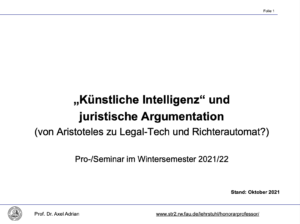
You can find the slides for the course here.
SS 2021
Pro-/Seminar
The pro/seminar was held as a Zoom meeting.
In the summer semester of 2021, I will be teaching a pro/seminar on the law of democratic parliamentary elections.
In the proseminar, the first hour will teach how academic work and classical legal reasoning and argumentation works. Then we will deal with questions of electoral law.
How has the right to vote developed historically and which elections are available for people living in Germany. There will also be comparative studies of various foreign legal systems in contrast to the German legal system, e.g. in connection with questions about the possibility of proxy voting in electoral law or in connection with various minimum/maximum voting age limits. In addition to questions of substantive law, the discussion will also focus on various legal remedies available in the German legal system for contesting elections or the right to vote. Finally, there will be an outlook on possible technical possibilities (e.g. via legal-tech tools) of democratic participation, as well as in connection with demoscopic, sociological and psychological questions. At the end of the last double lesson the topics will be assigned, e.g.
- The right to vote in antiquity
- The development of the right to vote in modern times (from three-class suffrage to the right to vote from birth?)
- Comparative presentation of European, Bundestag, Bavarian state parliament and local elections using the example of BVerfG of 15.4.2019 – 2 BvQ 22/19
- Comparative presentation of legal remedies in European, Bundestag, Bavarian state parliament and local elections
- Comparative legal studies on voting age restrictions in different legal systems
- Comparative legal studies on the possibility of substitution in the exercise of the right to vote in various legal systems
- Art 7 Bavarian Constitution and minimum age for basic rights as well as for the right to vote
- How is counting done in federal elections? – Differences D’Hondt-, Hare- Niemeyer-, Sainte-Laguë-method (counting and success value, overhang mandates, reforms)
- Right to vote from birth and election to the German Bundestag
Sociological and demoscopic issues in the discussion on voting rights from birth and on lowering the voting age. - The influence of technology (e.g., (social) bots) on political opinion formation/campaigning/election results- USA? Fukushima?
- Use of modern technology (legal tech?) for polls and political participation
The videos of the event can be found here.
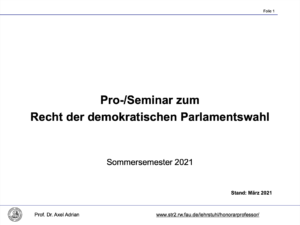
You can find the presentation slides here.
Conference „Digitization of Civil Process and Enforcement“
On July 1 and 2, 2021, the conference „Digitization of Civil Process and Law Enforcement“ – hosted by Prof. Dr. Axel Adrian and Dr. Martin Zwickel – took place at FAU.
The program can be found here. The conference dealt in five parts with central issues of the digitization of civil process and law enforcement and is intended to expand in several respects the already intensive discussions of the ideas available with the discussion paper of the working group Modernization of Civil Process:
The legal issues were supplemented by the expertise of computer scientists and discussed from a joint perspective.
At appropriate points, a practical/interdisciplinary view or expansion of the working group’s proposals took place, e.g., by including communication psychologists, bailiffs, and actors in consensual dispute resolution.
A look at similar systems to be discussed for the judiciary, such as the automatic verification of income tax returns and the upcoming online incorporation of limited liability companies, can also be helpful in questions of the digitization of the judiciary.
Foreign legal systems often provide rich illustrative material on individual issues relating to the digitization of civil proceedings. Even if a direct adoption of foreign legal institutions often comes up against limits, comparative law experience reports should by no means be ignored.
My summary of the conference can be found here.
The videos of the conference can be found here.
WS 2020/21
The pro/seminar was held as a Zoom meeting.
The course will thematically address, for example, whether the concept of argument can be defined at all, whether criteria for „valid“ arguments can be established, whether „convincing“ arguments can be distinguished from merely „persuasive“ arguments, etc. Finally, philosophical references e.g. to philosophy of science and epistemology are pointed out. How, for example, have the criteria of scientific testability changed, starting from intuition, via verification and falsification, to the question of the rationality of arguments? At the end, references to symbolic AI and to the question of the possibility of representing legal arguments with machines will also be addressed.
The videos of the 4 double lessons of the event can be found here.
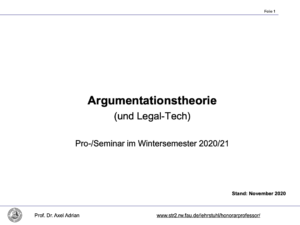
You can find the presentation slides here.
SS 2020
The lecture „AI and legal decision making“ took place as a zoom meeting. As guest speakers have lectured:
- Martin Kurtze, Siemens AG
- Hubertus Rust, Bavarian State Tax Office
- Dr. Tobias Wagner, DATEV eG
The videos of the 12 double lessons of the event can be found here.
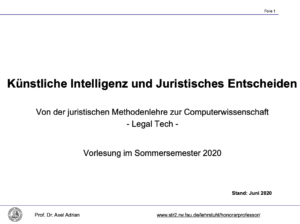
You can find the presentation slides here.
WS 2019/20
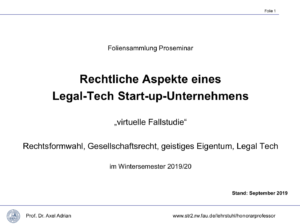
The presentation slides can be found here.
SS 2019
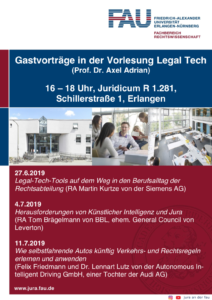
WS 2018/19
- Proseminar: Legal-Tech, legal theory and practice
- The judge’s vending machine will judge soon – Interdisciplinary perspectives on „Legal Tech“
Other
- Examiner in the oral first state examination for civil law and for the bachelor’s programme.
- Member of the board of the Digital Tech Academy der FAU.
Publications (Status 2022)
Dependent publications
- Juristische Methodenlehre und die „Keck-Entscheidung“ des EuGH, in: Europaisches Wirtschafts- und Steuerrecht 1998, p. 288 ff.
- Die Nailaer Demografie-Tage – Ziele, Inhalte, Bilanz und Perspektiven, in: Der demografische Wandel in der Grosregion Luxemburg 2005, p. 263 ff.
- Der Wettbewerb der Kommunen in der demographischen Schrumpfung, in: Der Bayerische Burgermeister 2005, p. 290 ff.
- Wie wissenschaftlich ist die Rechtswissenschaft? – Gibt es eine bindende Methodenlehre?, in Rechtstheorie Heft 4/2010, p. 521 ff.
- Der demografische Wandel, Wir schrumpfen und altern, in Datev Magazin 2012, p. 8 ff.
- Erben über Grenzen, Deutsche Erbschaft im Vereinigten Königreich, , in Datev Magazin 2013, p. 22 ff.
- Sicher auf neuem Terrain, Haftungsfragen rund um die Testamentsvollstreckung, in Datev Magazin 2014, p. 12 ff.
- Berliner bleiben, Vererbung, in Datev Magazin 2/2015
- Populär aber tückisch, Das Berliner Testament, in Datev Magazin 4/2015
- Der Richterautomat ist möglich – Semantik ist nur eine Illusion in Rechtstheorie Heft 1/2017, p. 77 ff.
- Besteht eine Rechtspflicht zur Einführung eines Wahlrechts ab Geburt? In frühe Kindheit Heft 6/2017 (Jubiläumsheft von Liga für das Kind 2017), p. 28 ff.
- Ist ein Wahlrecht ab Geburt rechtlich möglich? In Rechtspsychologie (RPsych) Heft 1/2018, p. 8 ff.
- Besteht eine Rechtspflicht zur Einführung eines Wahlrechts ab Geburt? In Rechtspsychologie (RPsych) Heft 2/2018, p. 208 ff.
- Juristische Methodenlehre – Ein Vorbild für verantwortungsvolle Digitalisierung?, In Verantwortungsbewusste Digitalisierung, Tagungsband des 23. Internationalen Rechtsinformatik Symposiums IRIS 2020, Hrsg. Erich Schweighofer/Walter Hötzendorfer/Franz Kummer/Ahti Saarenpää, Bern 2020
- Max Rapp, Axel Adrian, Michael Kohlhase, Context Graphs for Legal Reasoning and Argumentation, available at: https://arxiv.org/pdf/2007.00732.pdf
- Interview „Legal Tech Professor: ‚My proposal is to combine legal tech with basic subjects'“, available at: https://mkg-jura-studis.de/
- Book review of Büttner/Frohn/Seebach, Electronic Legal Transactions and Information Technology in Notaries, C. H. Beck, 2019 in MittBayNot 5/2020, p. 423 f.
- Of object and meta-levels: Analyzing the software requirements of computer-aided legal decision making. Axel Adrian, Max Rapp, Alexander Steen. In Recht DIGITAL – 25 Jahre IRIS, Proceedings of the 25th International Legal Informatics Symposium IRIS 2022, ed. Erich Schweighofer/Ahti Saarenpää/Stefan Eder/Jakob Zanol/Felix Schmautzer/Franz Kummer/Philip Hanke, Bern 2022, pp. 307 ff.
Independent publications
- Das kleine 1 X 1 der Aktiengesellschaft, Schriften und Arbeitspapiere der IHK Nürnberg für Mittelfranken Nr. 151/00, 3rd edition. 2006
- Grundprobleme einer juristischen (gemeinschaftsrechtlichen) Methodenlehre, Duncker & Humblot, Berlin, 2009
- Grundzüge einer allgemeinen Wissenschaftstheorie auch für Juristen, Duncker & Humblot, Berlin, 2014
- Grundsatzfragen zu Staat und Gesellschaft am Beispiel des Kinder-/Stellvertreterwahlrechts – Eine rechtliche Untersuchung mit Bezügen zu Demographie, Demoskopie, Psychologie und Philosophie, Duncker & Humblot, Berlin, 2016
- Brochure “ Brochure Election Examination Complaint to contest the European Election for DFV, FdK Würzburg and Liga für das Kind“ together with Anabel Adrian